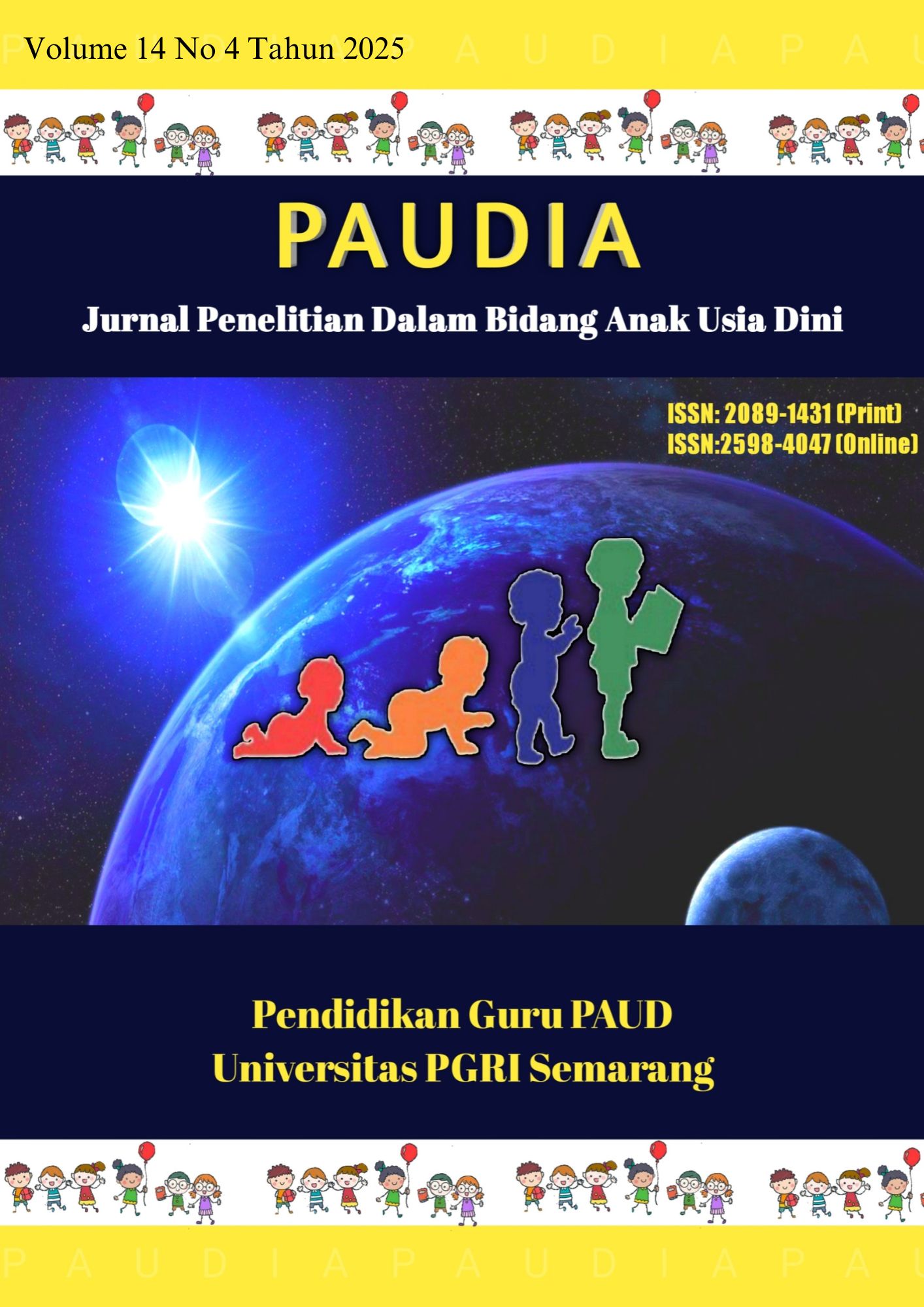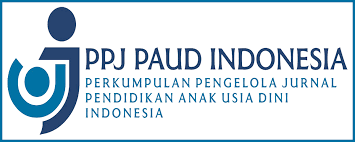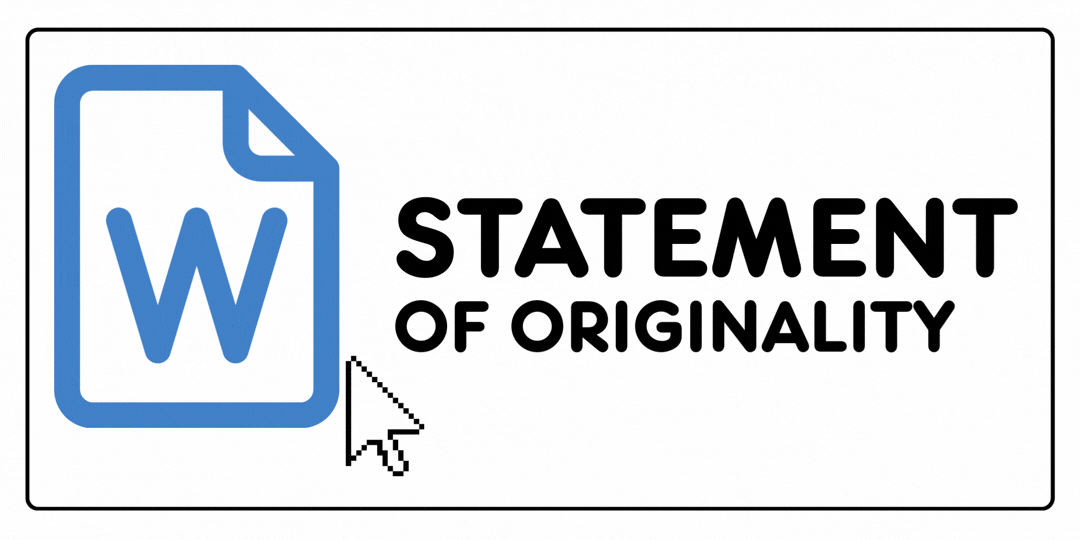Fostering Socio Emotional Development Through Inclusive Service Learning Projects for IECE Students
DOI:
https://doi.org/10.26877/paudia.v14i4.2389Keywords:
ECE student, Inclusive, Service-Learning, Socio EmotionalAbstract
Aspects of social-emotional development are critical to young children’s overall development, in early childhood inclusive classrooms where children have a wide variety of needs. In Indonesia, a number inclusive education programs continue to grapple with the development of empathy, cooperation and emotional regulation, demonstrating that evidence-based strategies for young children to develop these abilities is an urgent priority. This investigation focused on the effect of service-learning experiences for children in inclusive early childhood programs. Twelve 5- to 6-year-old students participated from an inclusive classroom, using a mixed-method design. The collection of quantitative data was provided from PAPI testing, while the qualitative part consisted of classroom observations around peer interaction and affect regulation as well as semi-structured teacher interviews about engagement and feasibility. Students, overall, demonstrated a 32% average increase in social-emotional competence with the largest increase in empathy (35%), cooperation (30%) and emotional regulation (28%). Teachers noted better participation and cooperation between students as well. These results suggest that service-learning is an effective intervention for promoting social-emotional competence in inclusive preschool classrooms. The research contributes with practical applications for Indonesian educators and policy makers to implement service-learning in inclusive education that supports both social-emotional development as well as equitable learning beginning in the early years of education.
References
Ainsworth. (1978). PATTERNS OF ATTACHMENT.
Ahmed, I., Hamzah, A. B., & Abdullah, M. N. L. Y. B. (2020). Effect of social and emotional learning approach on students’ social- emotional competence. International Journal of Instruction, 13(4), 663–676. https://doi.org/10.29333/iji.2020.13441a
Bandura. (1977). Bandura_SocialLearningTheory.
Bennett, J., Parsons, S., & Kovshoff, H. (2024). Developing the emotion regulation skills of autistic pupils in educational settings: A systematic literature review. Journal of Research in Special Educational Needs , 24(3), 475–491. https://doi.org/10.1111/1471-3802.12646
Blewitt, C., O’Connor, A., May, T., Morris, H., Mousa, A., Bergmeier, H., Jackson, K., Barrett, H., & Skouteris, H. (2021). Strengthening the social and emotional skills of pre-schoolers with mental health and developmental challenges in inclusive early childhood education and care settings: a narrative review of educator-led interventions. In Early Child Development and Care (Vol. 191, Issue 15, pp. 2311–2332). Routledge. https://doi.org/10.1080/03004430.2019.1704283
Deci, E. L., & Ryan, R. M. (2000). The “What” and “Why” of Goal Pursuits: Human Needs and the Self-Determination of Behavior.
Denham, S. A., Bassett, H. H., & Zinsser, K. (2012). Early childhood teachers as socializers of young children’s emotional competence. In Early Childhood Education Journal (Vol. 40, Issue 3, pp. 137–143). https://doi.org/10.1007/s10643-012-0504-2
Eisenberg, N., Spinrad, T. L., & Knafo-Noam, A. (2015). Prosocial Development.
Elias, M. J. (2004). The connection between social-emotional learning and learning disabilities: Implications for intervention. Learning Disability Quarterly, 27(1), 53–63. https://doi.org/10.2307/1593632
Eyler, J. (2002). Reflection: Linking Service and Learning-Linking Students and Communities. In Journal of Social Issues (Vol. 58, Issue 3).
Filges, T., Dietrichson, J., Viinholt, B. C. A., & Dalgaard, N. T. (2022). Service learning for improving academic success in students in grade K to 12: A systematic review. In Campbell Systematic Reviews (Vol. 18, Issue 1). John Wiley and Sons Inc. https://doi.org/10.1002/cl2.1210
Gross, J. J., Feldman Barrett, L., John, O., Lane, R., Larsen, R., & Pennebaker, J. (1998). The Emerging Field of Emotion Regulation: An Integrative Review. In Review of General Psychology (Vol. 2, Issue 5).
Hassani, S., & Schwab, S. (2021). Social-Emotional Learning Interventions for Students With Special Educational Needs: A Systematic Literature Review. In Frontiers in Education (Vol. 6). Frontiers Media S.A. https://doi.org/10.3389/feduc.2021.808566
Hollingsworth, H. L., & Winter, M. K. (2013). Teacher beliefs and practices relating to development in preschool: importance placed on social-emotional behaviours and skills. Early Child Development and https://doi.org/10.1080/03004430.2012.759567
Isabella, W., Saggers, B., & Research Online, G. (2014). Strengthening social and emotional learning in children with special needs Book Title Health and Wellbeing in Childhood Rights statement Link to published version. http://hdl.handle.net/10072/66523http://www.cambridge.org/gb/academic/subjects/education/education-history-theory/health-and-wellbeing-childhood
Khoiriyah, U., Setyowati, S., Nursalim, M., & Khamidi, A. (2024). Analysis of Inclusive Education Policy Implementation in Developing Countries. EDUKASIA: Jurnal Pendidikan Dan Pembelajaran, 5, 851–858. https://jurnaledukasia.org
Knezović, N. (2020). All Learning is Social and Emotional : Helping Students Develop Essential Skills for the Classroom and Beyond. Acta Iadertina, 16(2). https://doi.org/10.15291/ai.2953
Mamuaya, C. L. (2025). Building Better Behavior: How School Environments Shape Student Character. International Journal of Scientific Research and Management (IJSRM), 13(05), 4105–4112. https://doi.org/10.18535/ijsrm/v13i05.el05
Marliana, L., Dewi, N. F. K., & Jaya, D. E. (2025). Implementation of Inclusive Education in Playgroups. PAUDIA : Jurnal Penelitian Dalam Bidang Pendidikan Anak Usia Dini, 393–406. https://doi.org/10.26877/paudia.v14i2.1614
McMillan, D. W., & Chavis, D. M. (1986). Sense of community: A definition and theory. Journal of Community Psychology, 14(1), 6–23. https://doi.org/10.1002/1520-6629(198601)14:1<6::AID-JCOP2290140103>3.0.CO;2-I
Morch, A. I., Hartley, M. D., & Caruso, V. (2015). Teaching interpersonal problem solving skills using roleplay in a 3D virtual world for special education: A case study in second life. Proceedings - IEEE 15th International Conference on Advanced Learning Technologies: Advanced Technologies for Supporting Open Access to Formal and Informal Learning, ICALT 2015, 464–468. https://doi.org/10.1109/ICALT.2015.139
Morton, B., & Pilgrim, J. (2023). Promoting inclusive education: social and emotional learning through the Lens of Universal Design for Learning. Eesti Haridusteaduste Ajakiri. Estonian Journal of Education, 11(1), 28–47. https://doi.org/10.12697/eha.2023.11.1.02b
Okongo, R. B., Ngao, G., Rop, N. K., & Nyongesa, W. J. (2015). Journal of Education and Practice www.iiste.org ISSN (Vol. 6, Issue 35). Online. www.iiste.org
Rahmawati, I., Filasofa, L. M. K., & Mursid. (2025). Achieving Inclusivity: Uncovering Constraints and Challenges in Accepting Children with Special Needs in Non-Inclusive Schools. PAUDIA: Jurnal Penelitian Dalam Bidang Pendidikan Anak Usia Dini, 525–543. https://doi.org/10.26877/paudia.v14i3.1764
Rafiyya, A., Kraiwanit, T., Limna, P., Sonsuphap, R., Kasrisom, A., & Snongtaweeporn, T. (2024). Early childhood social-emotional development: an impact on a developing country. International Journal of Evaluation and Research in Education, 13(5), 3081–3089. https://doi.org/10.11591/ijere.v13i5.29462
Raver, C. C. (2002). Emotions Matter: Making the Case for the Role of Young Children’s Emotional Development for Early School Readiness. Social Policy Report, 16(3), 1–20. https://doi.org/10.1002/j.2379-3988.2002.tb00041.x
Sciacca, J. L. (2025). TEACHER EXPERIENCES WITH PJBL AND EBD 1 Experiences of Teachers Using Project-Based Learning with Students with Emotional and Behavioral Disorders.
Sin, D. Y. E., Chew, T. C. T., Chia, T. K., Ser, J. S., Sayampanathan, A., & Koh, G. C. H. (2019). Evaluation of Constructing Care Collaboration - Nurturing empathy and peer-to-peer learning in medical students who participate in voluntary structured service learning programmes for migrant workers. BMC Medical Education, 19(1). https://doi.org/10.1186/s12909-019-1740-6
Stalmach, A., Reinck, C., D’Elia, P., Di Sano, S., & Casale, G. (2025). A conceptual impact model of digital support for student self-regulation and emotion regulation grounded in self-determination theory. Discover Education, 4(1). https://doi.org/10.1007/s44217-025-00825-8
Stavroula, V. A., & Mary, K. (n.d.). Investigating the Impact of Differentiated Instruction in Mixed Ability Classrooms: It’s impact on the Quality and Equity Dimensions of Education Effectiveness.
Sudimantara, L. B., Baehaqi, L., Lian, A., & Lian, A.-P. (2025). Multisensory CALL for Under-Resourced Universities and Schools in Indonesia. In Multisensory CALL for Under-Resourced Universities and Schools in Indonesia. https://doi.org/10.1007/978-3-031-91387-7
Vitriana, B., Purwanti, S., Honest, B., Ramadhani, D., Mulia Balikpapan, U., & Timur, K. (2024). Kesiapan Sekolah dalam Melaksanakan Pendidikan Inklusi di PAUD. 13(2), 303–314. https://doi.org/10.26877/paudia
Walog, R., Revalde, H., Duites, A., Opingo, K. M., Mangubat, R., & Espina, R. (2024). Journal of Humanities and Social Sciences Studies Building Social-Emotional Foundations in Early Childhood Education: Approaches and Outcomes. https://doi.org/10.32996/jhsss
Downloads
Published
Issue
Section
License
Copyright (c) 2025 Bimbi Lastri Prima Asih, Ernawulan Syaodih, Asep Deni Gustiana, Nordiana Zakir

This work is licensed under a Creative Commons Attribution-NonCommercial-ShareAlike 4.0 International License.







